
Yesterday, we brought you Ken Levine’s explanation of BioShock: Infinite’s 1999 mode. The response was, perhaps inevitably, divided. Here’s the second part of my chat with him, in which he anticipates that, as well as addressing the fact he can only offer a biased opinion of his game, the problem with out of context headlines, tennis in BioShock, why SWAT 4 would have been a very different game under his stewardship and, yes, why “if you’re a reader on Rock, Paper, Shotgun, you are sophisticated enough to not listen to what Ken Levine says.”
When we left off, Ken Levine was talking about his desire to achieve greater clarity in what he says in interviews…
RPS: It must be extra-tough to try and be completely clear in what you’re saying in this age of the out of context headline, where in a moment some site might take something you said off the cuff and change its meaning by having it stand alone or be put in proximity to something else.
Ken Levine: Oh yeah, that happens all the time. That comes with the territory, but what those headlines do… There is a good thing and a bad thing about those headlines. The worst kind is when it’s “Levine says so-and-so” and someone’s even put it in quotes, but they’re actually not quotes. They’re a summation. I had this happen yesterday; somebody took something out of the [1999 mode] press release and they read the word ‘permanence’ and the word ‘death’ as to mean an Iron Man mode – where if you die, you can’t continue. So it said “Levine said this”, and it’s actually not what we said in the press release, but it sort of conflated things.
So what that kind of experience has me do, especially being more in the public eye in the past few years… and when you’re just talking to somebody, like we’re just having this conversation Alec, you want to just have a conversation, you just want to talk about things. But then you realise that you have this responsibility, because people are going to be reading and people are going to be analysing, to make sure that the things you say are very difficult to misinterpret or – not even misinterpretation, because that’s putting the onus on the reader rather than me – that I don’t say anything that lacks clarity.
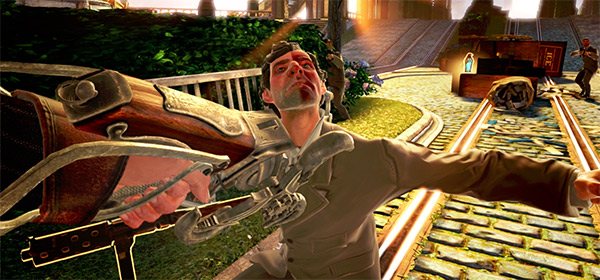
So I try to be as clear as I possibly can, because people will read things and maybe they misinterpret or maybe I’ve misspoken, I haven’t be clear enough. Not misspoken actually – misspoken is a word politicians use when they lie [laughs]. Or, when I spoke about System Shock 2 on BioShock 1, that was a completely honest thought, I really thought at the time that that was what that game was. I actually still very much feel that; I think there is a very large number of people, especially on sites on RPS, that disagree with that, so that is one of the reasons that we’re thinking about this mode – to look at that audience and say ‘what were they dissatisfied about?’
And let me tell you something, I can guarantee you that somewhere in the comments section on RPS, there’ll be [adopts forceful tone] ‘Levine has no idea what we were dissatisfied about! This idiot thinks that the problem in BioShock was permanence, but the problem was this’ That’s going to happen, and we’re doing our best to look at our work, and this is not is just an external thing. When that guy said about the permanence thing, I was “oh my god, that makes total sense to me as a gamer, that is exactly something I would have liked to have played”, and the problem I’d had before was nobody had said something to me that resonated as a gamer.
Whereas people would say “oh, I hate Rapture, I hate the Little Sisters” – that doesn’t resonate with me, because obviously I don’t hate Rapture. It’s a much harder thing to argue with: “I hate Andrew Ryan, I hate Big Daddies.” I like those things, and we can’t make a game we don’t like. It’s much easier when someone comes to me and says “I miss permanence”, then I’m “oh, testify brother, I also miss that.” You can only make games that you want to make – you can’t make a game for somebody else.

RPS: Plus, when people are disagreeing with you on something, there’s the issue of presenting interviews and quotes in plain text, like you’ve stood on top of mountain and declared them like a commandment, as opposed to part of a discussion where there’s a back and forth and the other party can seek more clarity.
Ken Levine: Yeah. I tend to read comments sections on RPS more than on a more general place, because I am that kind of gamer. There’s all this weird crazy shit that I never would have heard of otherwise, all these PC games that I want to play, and that and Quarter To Three are my go-to sites for finding out about weird PC games. In comments sections, I feel a lot of the things that people feel there because I am that kind of gamer. But [sometimes] I am also being interviewed in the body of text and that’s being interpreted in a certain way, and that’s completely valid. I am definitely a ‘customer is always right’ kind of guy: they’ve given us their 50 bucks, we have a responsibility to give them something they’re going to enjoy. So we do the best we can when we talk about the game, we do the best we can when we design the game, but there’s never a time where we make a game for somebody – we have to make a game for ourselves. If you’re trying to chase some demographic that you’re not part of, you’re really going to fail.
RPS: That’s how you end up with stuff like CityVille…
Ken Levine: Yeah… although maybe the guy who designed CityVille, maybe that was exactly the kind of game he wanted to play, I can’t speak for him. But we only make games that we wanna play; when I look at the games that Irrational has made, specifically the games that are nearest and dearest to my heart, System Shock and BioShock and Freedom Force, because those are the games that as a gamer I want to play.. But then the guys on the team who made SWAT 4, I had very little to do with that, they had a passion for that experience, and I think they knocked it out the park.
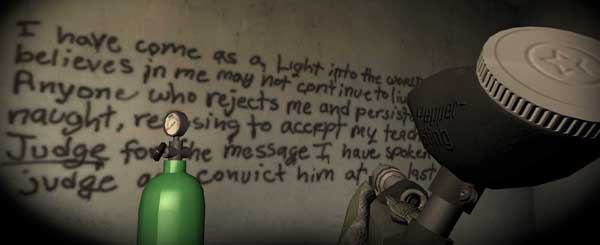
RPS: Yeah, that’s quietly an amazing game.
Ken Levine: Yeah, they were making the game they wanted to make. Guys like Bill Gardner, Chris Klein, Sean Robertson, they really love that game, and they wanted to make that kind of game. I think if I was leading that kind of game it wouldn’t be very good: I liked SWAT 3, I played it and enjoyed it, but it wasn’t one of my huge passions. These guys, they did a great job with it – if I had lead that project it wouldn’t have been nearly as good.
RPS: It might have been, but in a very different way. Probably with monsters in.
Ken Levine: Yeah, after it when they turned to me and said “okay, what are we doing next?” and Vivendi wanted another SWAT game and it was my turn to lead, I was like “I can’t do that. Let’s make a zombie SWAT game!” We talked about that on our website; that was something I was much more interested in, but that would probably have very much disappointed the hardcore SWAT fans because that’s not what they’re interested in. So you do the best you can, but at the end of the day if you’re making a game for somebody else it’s really asking for failure.
RPS: I think the world still wants to see that zombie SWAT game, you should make it sometime.
Ken Levine: [laughs] I was watching 28 Days Later recently and I was like “ah, man – there’s really a great game there.” So yeah – look, we’re only human, we do the best we can, when we make the game and when we talk about the game and I just want to make sure, especially in this mode that I’m speaking with incredible clarity.

RPS: Something else that’s maybe got in a way with that in the past is the conflict between this perception that Irrational, and often you specifically, are the smartest guys in the room for mainstream games, so everyone wants to ask you about philosophy and literature, but actually you’re also making a game about shooting guys in the face and that doesn’t always get conveyed.
Ken Levine: Yeah, certainly often when a journalist comes to us to talk about BioShock there’s a disparity between… They want to talk about deeper philosophical issues, and they’re less interested in the game systems – but there’s a large section of the audience that just wants to shoot stuff. And I’m of two minds about this myself – I love, obviously, some of the philosophical underpinnings, and I’m certainly very interested in the historical setting, but I’m also really interested in all the game system stuff. So what’s been fun, especially in the 1999 mode, is it really asks us to go back and dig into that old school gamer systems head, deeply into that space and say ‘what is the delta between BioShock and a game we would have made in 1999?’
That’s been a really interesting design challenge, because it eluded me for a long time – and again I guarantee there’ll be someone in the comments section saying “Levine it’s still eluding you, trust me, you’re an idiot.” And that may very well be true, but for me as a gamer this is the piece that was missing. I’m never going to chase [i.e. design the game towards] some gamer who’s unhappy with our game, because the only gamer I can chase who’s not happy with our game is myself.
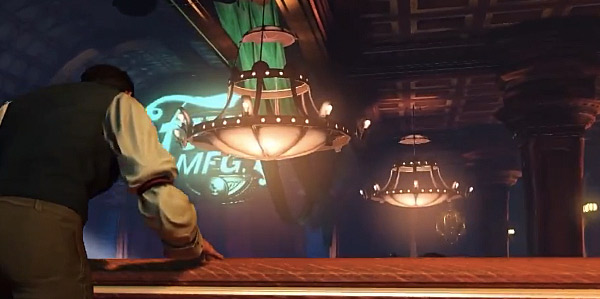
People on the team, the only people they can chase is themselves. If I start reading comments section and then start chasing every single person there and it’s an opinion that I don’t share… maybe it’ll be the right thing to do in a business sense, but I won’t be able to make that game, the team won’t be able to make that game, because it’s not in our DNA.
If someone says “you know what your game really needs? It needs tennis, a tennis simulation.” If someone came down from the heavens and said [boomy god voice] “Levine, if you make this game and you put a tennis simulation in, you will sell ten million units”, that’d be great if I could make that, but I would fail – unless there was somebody on the team who just loves tennis, but as a creative director I would not be able to sit in level reviews and say “let’s talk about the tennis section.” It would just be terrible, you can only make what you love.
RPS: Although you’ve got to admit, playing tennis on those skyrail things in Infinite would be a lot of fun…
Ken Levine: [laughs] That’d be pretty good. Actually, I just realised, we do have a tennis thing in BioShock – when you first get telekinesis, you have that whole little tennis room. Maybe I have a weird fetish for tennis I never thought about…
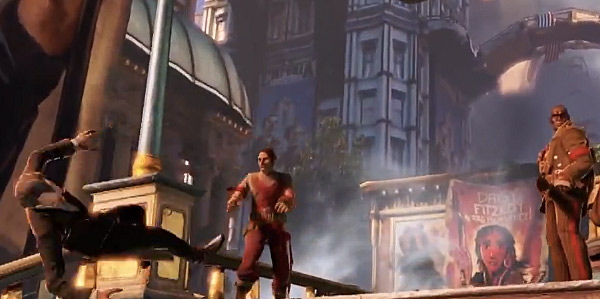
RPS: Do you think, given your urge for clarity, the world does have a clear sense of what BioShock: Infinite is yet? Having presumably seen the reportage and reader feedback around it, has the message been conveyed properly, or are people seeing it through the prism of BioShock 1 and the hype around it too much?
Ken Levine: Well, we’ve only talked about a segment of it, there’s a percentage we haven’t talked about yet. What I would say to the audience is, if you’re reading Rock, Paper, Shotgun, the last thing I think you should do is buy any game based upon what the spokesperson for that game says. What you should do is wait for the game to come out, read a bunch of reviews that you trust, talk to your friends that you trust, and make your purchasing decision based on that. Not because I think anything we’re saying isn’t accurate or true, but because boy, you’re going to get a much better opinion from the people you trust. They’ll be able to give you a much better sense of what the game is, because they’ve played the game through, they can tell you every single thing about it.
I’m only talking right now about a segment of the game, and I’m obviously biased towards liking this game because it’s towards my tastes as a gamer. There’s no denying that. If you’re a reader on Rock, Paper, Shotgun, you are sophisticated enough to not listen to what Ken Levine says, or not listen to what any [developer] says about any game: go to the reviews, go to the people you trust, because you know they’re going be completely unbiased. This is my baby, I spent five years on this thing – you think I’m not biased? Of course I’m biased.
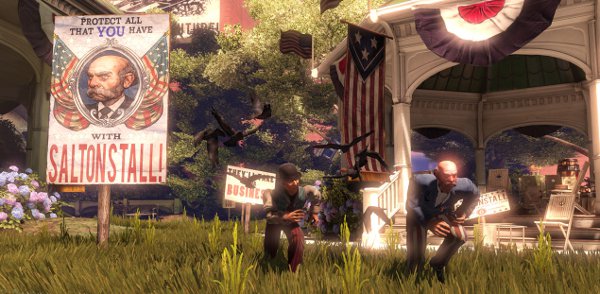
RPS: There’s a terrible part of me that wants to use “Levine: RPS readers are too sophisticated for me” as a headline. But I won’t. Or… will I?
Ken Levine: [chuckles] It’s true though, your audience is very capable of following their truth about the game. They don’t need me for that. I think, I hope the preview process is going to be very entertaining for them, but if they’re making careful purchasing decisions, never rely on a preview process for that, because they don’t need to. I’m 45, I’ve come to a point in my life where I can afford to buy almost any game I want, so I don’t need to dig that deep into reviews – time is more of an issue for me – so I can really just try things, and if I don’t like them I can just say ‘I’m not going to play that any more’, and I’m very, very fortunate to be able to do that. But not everybody’s in that situation, either financially or time-wise, so they should not rely on any preview process. Ever. Not because it’s dishonest, but because they don’t need to: they can go to a much deeper source.
RPS: Yeah, we often feel uncomfortable about writing and calling things ‘previews’ on RPS, because we know to some extent it’s guided by marketing, by being shown controlled elements of the game in a certain way, and need to make sure that whatever we say about it doesn’t come off as though it’s a review.
Ken Levine: Yeah, because how can you [the developer] be objective? It’s impossible. I love this. It’s our baby. If you’re looking to me to give you an objective opinion, boy you’re looking in the wrong place.
RPS: Thanks for your time.
BioShock: Infinite will be released… well, we don’t know that yet. But hopefully soon.
http://www.rockpapershotgun.com/2012/01/24/levine-on-bias-trust-swat-tennis/

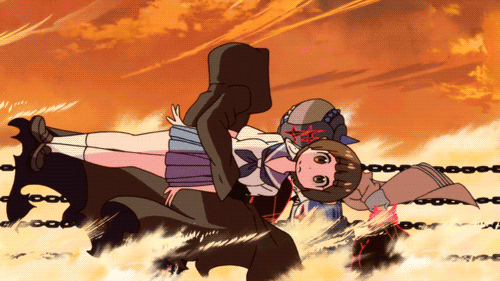 @TheVoxelman on twitter
@TheVoxelman on twitter
















